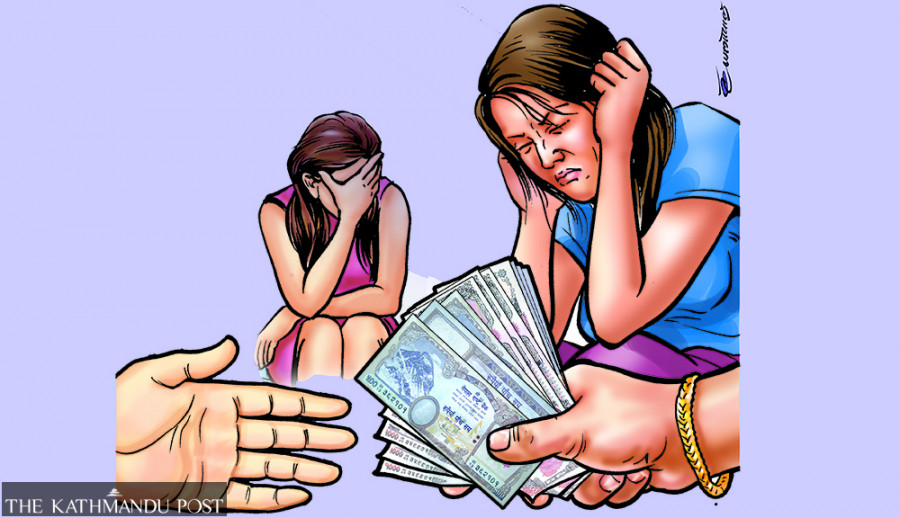
A 15-year-old girl from Dhading studying in grade six in Kathmandu dropped out of school when her parents separated. After their separation, both her parents married other people, forcing her to quit her studies in Kathmandu and move to Dhading.
In Dhading, she could not continue her studies because she got busy doing household chores and other work, for money. After some time, her aunt, who had been living in India for a very long time, came to see her and lured her to go with her to India. Her aunt convinced her with various temptations and said she would get her a good job with a nice salary, if she came along.
With the consent of her parents, her aunt took her to India. She was sold to a brothel at a place called Budhwar Peth in Pune. The life of the teenage girl, who was studying in sixth grade, suddenly took a nasty turn.
The girl was rescued by Maiti Nepal, a non-profit organisation, the day after she was sold four months ago. “The girl is taking shelter in Maiti Nepal in Kathmandu,” said Maheshwari Bhatta, coordinator of the Kanchanpur office of Maiti Nepal.
"Even though the girl was rescued, the case could not be pursued as the aunt who sold her in the Indian brothel was not found," said Bhatta.
According to her, most of the girls and women who are sold to brothels are trafficked by their own relatives or family friends. “The human traffickers trap the girls from poor families, luring them with offers of good jobs or other similar temptations. They take the victims to India with the consent of their parents and force them to involve themselves in flesh trade,” said Bhatta.
Manmaya, a 19-year-old girl also from Dhading who the Post is identifying with a pseudonym, got married at the age of 14. She gave birth to a baby boy after a year. Within two years of the marriage, her husband married another woman, and the mother and son were left stranded. She later returned to her parents.
Manmaya had been living at her parents’ house, doing nothing for some time. One day, her mother’s friend came to her and asked her to come with her to India, where she could get a good job with a handsome salary. Thinking about her child’s future, she agreed to go along with her mother’s friend.
Manmaya finally landed in a brothel in Pune a year ago. The girl was rescued in August from India on Maiti Nepal’s initiative. After her rescue, a case was registered against the woman who had trafficked her to the Indian brothel. Currently, Manmaya is living with her parents in Dhading, a hill district that borders the national capital.
According to Maiti Nepal, they have rescued 30 Nepali girls and women from different parts of India over the past one year. Most of them were trafficked by their relatives and family friends. The women were rescued from places like Delhi, Pune, and Kolkata.
Though 30 victims were rescued from India in the past one year, only two cases have been registered in local police offices so far. In most of the cases, the parents and the relatives are involved, directly or indirectly. So the victims are reluctant to go into litigation.
"Most of the victims do not file a case because their parents, knowingly or unknowingly, and their relatives were involved. They don't want to come forward, saying that whatever happened cannot be changed. Some victims initially agree to file a complaint, but later change their minds," lamented Bhatta.
Similarly, another adolescent girl was rescued from Pune three months ago. She was enticed by her friends who worked there. She came to know that she had been trafficked only when she reached the prostitution centre. After her rescue, she was kept in a safe house of Maiti Nepal in Kathmandu for three months and was recently sent home.
In the current fiscal year, only a single case of human trafficking was filed in Kanchanpur.
According to Inspector Bharatraj Giri at the District Police Office Kanchanpur, the only case filed this year is that of a woman from Kailali who was trafficked to India.
Most cases of human trafficking are not filed because the victims don’t want to register any complaints and refuse to provide any further information related to the crime because, in some way or the other, people known to them are involved.
"Among the unregistered cases related to human trafficking, most of the victims were lured to India by their relatives or friends. Knowing the weak points of poor girls and women, they convince them with various temptations and take them to India and sell them to brothels," said Giri.
The Peace Rehabilitation Home, a social organisation working against human trafficking in Gaddachauki of Kanchanpur, has rescued seven women and children this year. Its record also shows that most of the girls and women were trafficked by their own relatives.
"Most of the females who were rescued by us were convinced to go to India by their friends and acquaintances," said Sanjit Singh, coordinator of Peace Rehabilitation Home.
"The risk of women and girls being trafficked to India is increasing due to poverty, illiteracy, unemployment, and lower wages in our country. The influence of social media has also increased the risk of human trafficking. Currently, through social media, criminals get access to poor girls and trap them," said Bhagwati Singh, a human rights activist working in Kanchanpur.












